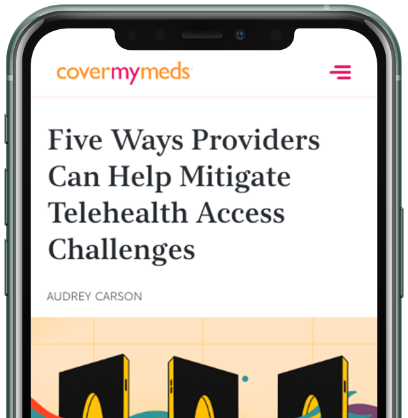'Crohn's Won't Hold Me Back': How Sophia Crisis-Proofed Her Healthcare
Patients' chronic conditions can worsen during a crisis, making it increasingly difficult to maintain treatment levels. To keep everyone connected and make sure needs are met, it's important to have the right healthcare technology in place. Here, we share the story of Sophia Garland, a young professional living with and learning to manage a chronic medical condition that requires specialty medication.

The COVID-19 pandemic has transformed how people manage their healthcare. For many patients with chronic conditions, the pandemic significantly disrupted access to necessary care and therapies. These patients need more frequent doctor’s appointments and, often, require complicated specialty therapies to help them live healthier lives.
The story of Sophia Garland helps show why maintaining access to specialty therapies should be protected from any crisis — pandemic or otherwise.
Diagnosed with Crohn’s disease when she was 12 years old, Sophia’s condition was managed throughout her teen years with medications and regular checkups, allowing her to enjoy middle and high school with little or no noticeable symptoms.
It definitely gets confusing with all the different medications I’m on and trying to refill them because they go through different pharmacies.
Sophia Garland
During this time, Sophia’s mother took responsibility for her care, but that changed when Sophia left for college. Around that time, Sophia assumed responsibility for managing her condition, including setting up doctor’s appointments, ordering medication refills and managing tests and scans.
“I didn’t realize how much (my mom) was doing until it was my turn to do it,” Sophia said. “It definitely gets confusing with all the different medications I’m on and trying to refill them because they go through different pharmacies.”
Patients managing one or two chronic conditions average six outpatient visits each year and nine prescription fills, with numbers increasing to correlate with the number of conditions each person has.
For Sophia and other patients managing chronic conditions during a crisis, like the COVID-19 pandemic, integrated technology solutions that can give providers a more comprehensive view into their patient’s medication access journey can help reduce time to treatment.
In fact, recent data shows that providers with this integrated technology can help patients access the medicine they need an average of 8 days sooner when comparing electronic to manual methods.CoverMyMeds data on file. Case study of programs analyzed from April 2019 to November 2021
During a crisis, medication access challenges can cause health issues for chronic care patients
When Sophia moved from Missouri to Pennsylvania for college, she experienced treatment hurdles that ultimately affected her health. At that time, her doctor switched the dosage of one of her specialty medications to be administered more frequently than was typically prescribed for that medication.
This resulted in a delay due to prior authorization (PA) requirements, which left her Crohn’s untreated while she and her care team waited on a PA determination. Unfortunately, delays like this aren’t that uncommon for chronic care patients, who can wait as long as 8 weeks for approval, which is how long Sophia had to wait.
While her medication access was delayed, Sophia’s untreated condition led to a weeklong hospital stay with Clostridiodes difficile (C.diff), an Escherichia coli (E. coli) infection, and mononucleosis.
How providers can best maintain treatment for chronic care patients during a crisis
For patients with chronic conditions, staying on top of their treatment during a crisis can be more challenging than it is for others. As the COVID-19 pandemic demonstrated, patients with chronic conditions might have limited or no access to office visits during a crisis. On top of those obstacles, many who are immunocompromised may fear going to the doctor for treatment because they’re more susceptible to illness.
Last year, a survey of chronic care patients found varied levels of concern. Twenty-four percent of patients with a chronic condition had to delay or forgo in-person healthcare due to fear of contracting COVID-19. Meanwhile, 51% of patients with a chronic condition had to delay or forgo in-person healthcare due to COVID-19-related restrictions/shortages.CoverMyMeds Patient Survey, 2021
This is where technology can help patients with chronic conditions stay current with their regular checkups. For example, telehealth and remote monitoring technology allow providers to check patients’ conditions without them having to come into the office. Another service that can help chronic care patients maintain their treatment during a crisis is using local pharmacy home delivery services or mail-order pharmacies, which can deliver medications to homes when trips to the pharmacy aren’t desired or, in some cases, an option.
Providers can also recommend behavioral coaching, which pairs chronic care patients with a support specialist trained in all aspects of medication adherence. For chronic care patients who can’t make office visits or have support staff visit their home, connecting to behavioral coaches via telehealth and smartphones can be a helpful way to get the care and guidance they need.
Since starting college and taking over management of her condition, Sophia’s also moved into a new apartment, navigated a new city and started a new job. Sophia, for example, learned how to administer her own injections at a local children’s hospital, where they also taught her how to safely store medications requiring refrigeration.
If anything, she’s more prepared than ever for the challenges life will present.
“I’m definitely nervous for all these changes in my life, but I don’t think Crohn’s is something that’s holding me back from any of it,” she said.
To learn more about the medication access, adherence and affordability challenges specialty patients face, read the 2022 Medication Access Report.
The latest healthcare insights, floated right to your inbox.





